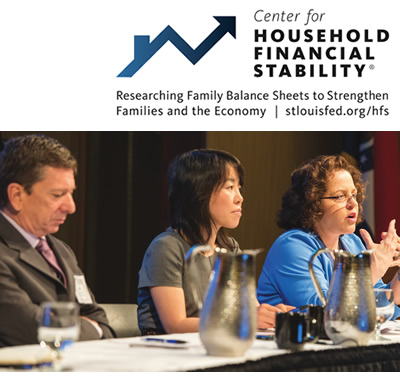Researching How Families Can Strengthen Their Household Balance Sheets
Center for Household Financial Stability
The Center for Household Financial Stability is a research initiative launched by the Federal Reserve Bank of St. Louis in May 2013. The center is focused on the rebuilding of the household balance sheets of struggling American families. Its research focuses on three main topics:
- What is the state of the American balance sheet? What can we say quantitatively about the overall health of the household balance sheet?
- Why does it matter? What are the economic and social outcomes—at both the household and macro levels—associated with varying levels of savings, assets and net worth?
- What can be done to improve household balance sheets? What are the implications for future research, public policy, community practice, financial institutions and households?

A public conference held by the Center for Household Financial Stability in 2014.
A basic premise of the center is that families improve their financial stability through broad-based economic growth, higher net household incomes and, especially, stronger balance sheets. Financially stable families face less economic risk and more economic mobility within and across generations. As financially healthy families spend, save and invest more, the national economy grows, too.
The center's work includes conducting and publishing research on key balance-sheet issues, developing a household balance-sheet index and organizing research and policy conferences and public forums to better understand the balance-sheet issues affecting struggling families and communities.
Key Findings in 2013
- Families that were younger, that had less than a college education and/or that were members of a historically disadvantaged minority group (African-Americans or Hispanics of any race) suffered larger wealth losses in the Great Recession of 2007-09 and have been slower to recover their wealth since the recession than families that were older, had a college education or were white or Asian.
- Although the status of American household balance sheets had improved somewhat, the average American family still had not fully recovered the wealth lost during the recession by the end of 2013. The slow recovery of wealth was due primarily to housing, which only began to rise in value at the beginning of 2012.
- Today's seniors—who were born before the end of World War II—fared better than younger people during the recent recession. Seniors were more resilient going into the recession, as they had more liquid assets, more stock-market wealth and much less debt than younger people did.
- Between 2005 and 2013, student loan debt per capita in the U.S. grew by 176 percent to $3,407. On average, the increases in student debt since 2005 were larger in Eighth District states than in the nation.


